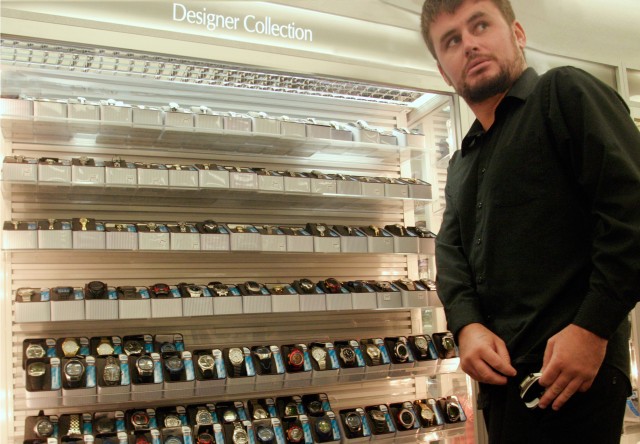GRAFENWOEHR, Germany - Now that the holiday shopping season is in full swing, the Army and Air Force Exchange Service has stepped up surveillance and is taking every precaution to prevent shoplifting.
According to U.S. Army Grafenwoehr Civilian Misconduct Action Authority statistics in 2009, larceny is second only to assault as the most frequent civilian misconduct charge in the Grafenwoehr and Vilseck communities. Unfortunately, children of service members are the fastest growing demographic of shoplifters with four times as many daughters of service members than sons being charged with larceny this year alone, according to Carolyn Beiter, assistant, USAG Grafenwoehr Civilian Misconduct Action Authority. In 2008, more than 50 percent of all civilian shoplifters at AAFES facilities were children of service members. Most instances of shoplifting involved merchandise of less than 70 dollars in value, with inexpensive items such as lip gloss and candy being the prime shoplifting targets.
As a result, AAFES and USAG Grafenwoehr's Directorate of Emergency Services teamed up to educate children on the consequences of shoplifting, Nov. 30. Fifth grade students from Netzaberg Elementary School attended a shoplifting awareness class followed by a tour of the AAFES loss prevention office in Grafenwoehr.
"Instead of an MP (military police officer) going to the school and talking to the students, we wanted to show them how the cameras worked in person so that maybe they would be less likely to shoplift," said Lt. Col. Shawn Driscoll, provost marshal, U.S. Army Garrison Grafenwoehr.
For minors, shoplifting is an "indicator of other risky behaviors such as substance abuse," said Beiter. A charge of larceny for a minor will result in a referral to Adolescent Substance Abuse Counseling Services, which will then conduct a total assessment of the child to determine if he or she is at risk.
Juveniles will be required to perform 20 hours of community service for their first offense, and adults, 50 hours. Both the ASACS referral and community service hours are voluntary, however, if the perpetrator fails to perform either, he or she could face a more serious punishment for second offenses such as being barred from the installation or an Early Return of Dependents.
AAFES has its own procedures for punishing shoplifters, as well. After a police report is filed, AAFES assesses a $200 civil recovery fee to "recoup administrative costs such as stopping the shoplifters, paying for cameras and loss prevention," said Gil Charette, loss prevention manager for AAFES.
If the stolen item is damaged or otherwise not sellable, the cost of the item will be seized added to the civil recovery fee. In addition, AAFES will revoke identification card privileges for six months for the first offense.
Not only does this mean offenders are prohibited from purchasing items from the PX, but they may not be allowed on AAFES facilities such as the food court, shoppette and movie theater.
Should an individual have privelages revoked, setting foot onto an AAFES facility will warrant a criminal trespassing charge, which is considered a second offense and could incur more serious consequences such as an Early Return of Dependents action.
A second charge of larceny will result in the suspension of AAFES privileges for one year and 50 community service hours for minors and 75 for adults. A civilian misconduct charge such as larceny will appear on a background check for adults and juveniles.
A larceny charge on a person's record could prevent a student from getting a summer job, or an adult from landing that job on post.
Charette said shoplifters increase prices of goods because retailers have to make up for the losses that larceny creates.
Shoplifting harms everyone, especially in the military community, since AAFES profits help fund Family and Morale, Welfare and Recreation programs.


Social Sharing